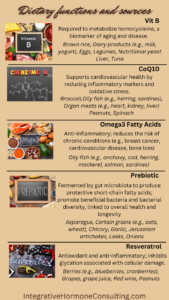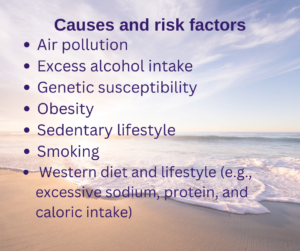| The following table summarizes longevity-promoting dietary components, their function, and their common sources.

Further, some research suggests that two dietary protocols, calorie restriction (CR) and intermittent fasting (IF), may promote longevity by improving cardiometabolic risk factors and promoting weight loss. CR involves reducing caloric intake by 20 to 40% while meeting nutrient requirements. IF involves regularly abstaining from calorie-containing foods and beverages for extended periods of time. Work with your integrative practitioner to support in implementing this type of lifestyle change.
Research in older adults has shown that social activity, such as conversation, and physical activity, such as moderate walking, may protect against cognitive decline. Regular exercise may also support weight loss efforts and protect against cardiometabolic conditions.
Being overweight and obese may increase your risk of arthritis and sleep apnea, as well as result in metabolic changes such as insulin resistance and increased inflammatory compounds. In overweight and obese individuals, weight loss of 5 to 10% improves the metabolic risk factors involved in type 2 diabetes, cardiovascular disease, and other chronic health conditions.
Sleep disturbances may worsen symptoms of an existing medical condition and increase the risk of mood changes. Factors that may contribute to sleep problems at any age include medical conditions, irregular sleep schedules, psychological stress, and exposure to noise or light in your sleep environment. Keep in mind that total sleep time decreases and sleep patterns change naturally as you age.
-
Other lifestyle considerations
Smoking cessation has been found to reduce the risk of death from cancer, coronary heart disease, and chronic obstructive pulmonary disease. Avoid excess alcohol consumption; this means limiting daily consumption to one standard drink for women and two for men. A standard drink is defined as a 12 oz (355 mL) regular beer (5% alcohol), a 5 oz (148 mL) glass of wine (12% alcohol), or 1.5 oz (44 mL) of 80 proof distilled spirits (40% alcohol).
*This handout was developed and medically reviewed by Fullscript’s Integrative Medical Advisory team.
*These statements have not been evaluated by the Food and Drug Administration. This information is not intended to diagnose, treat, cure, or prevent any disease.
Featured Supplements
(click images for more info)

|











